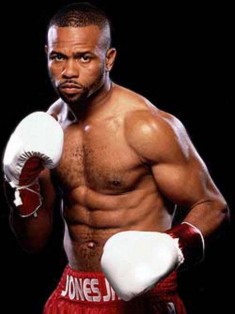| Roy Jones, Jr. | |
|---|---|
 |
|
| Boxer | |
| Born | Jan. 16, 1969 Pensacola, Florida, USA |
| Nationality | American |
Roy Jones, Jr. (born 1969) is a professional boxer from the United States. He has fought in a number of weight divisions ranging from middleweight to heavyweight, and has won multiple world championships. He is generally considered to be one of the finest and most versatile boxers of all time.
Early Years as an Amateur
Jones was born in Pensacola, Florida, on January 16, 1969. He started boxing while still a child and by the time he was a teenager, he was showing outstanding abilities in the ring. In 1984, he was victorious in the 119 lbs division at the U.S. National Junior Olympics.
Two years later, he won the first of his two National Golden Gloves awards with a win at 139 lbs, repeating the feat in the 156 lbs category in 1987. He was selected for the United States boxing squad at the 1988 Summer Olympic Games in Seoul, South Korea, where he was involved in one of the most infamous and controversial Olympic bouts of all time.
He reached the finals of the light-welterweight competition almost without breaking a sweat, never losing a round and showing complete dominance. However, after seemingly showing similar domination in the final against hometown fighter Park Si-Hun and landing almost three times the number of punches of his opponent, he was sensationally denied the gold medal by a 3-2 decision by the judges.
Many onlookers at the fight were convinced that Jones should have won, and even one of the judges reputedly later apologized. In 1997, the IOC undertook an investigation which discovered that three judges had been taken for a meal by South Korean officials. However, the result stood, although the Olympic scoring system had been changed as a result of the fight.
Professional Career
Jones made his pro debut in 1989 against Ricky Randall, impressing pundits and fans alike with a two-round knockout victory. Three years later, he won his first title, the super-middleweight Continental Americas championship, from the WBC. In 1993, he went on to record his first world title when he beat Bernard Hopkins to capture the IBF middleweight belt.
Jones had fractured one of his knuckles in the lead-up to that bout, and so had to fight Hopkins with full use of only one hand. In 1994, he successfully defended the title against James Toney, who was also the IBF super-middleweight champion.
Jones achieved a sensational feat in 1996 when he not only defended the super-middleweight championship, but he then increased his weight to fight for the WBC light-heavyweight belt – and won. This double, attained with his WBC victory over Mike McCallum, had not been achieved anywhere in professional boxing since the late 19th century.
At this point, Jones was regarded with something close to awe by many in the world of boxing, and his “Fighter of the Decade” accolade seemed no more than his due. He continued to be dominant in the ring through much of the 1990s and even into the 21st century.
Later Career Years
 Jones performed another remarkable feat in 2003 when he moved up the weight classes yet again to fight at the heavyweight division. Before him, only Michael Spinks had been a light-heavyweight champion who had gone on to win a belt in the heavyweight division, but Jones matched his achievement with a win over John Ruiz.
Jones performed another remarkable feat in 2003 when he moved up the weight classes yet again to fight at the heavyweight division. Before him, only Michael Spinks had been a light-heavyweight champion who had gone on to win a belt in the heavyweight division, but Jones matched his achievement with a win over John Ruiz.
He also beat Antonio Tarver that year, but in a 2004 rematch with Tarver he finally suffered his first defeat of his professional career. The sight of the previously all-conquering Jones being knocked out was startling to everyone in boxing, but it contained the seeds of his decline. He was never quite such an intimidating fighter again.
Nevertheless, Jones remained an active fighter, and in 2006 he beat Prince Badi Ajamu in a title fight, following up this success with a victory over Anthony Hamshaw the next year. However, he has lost several of his most recent bouts and no longer has the presence he once did.
Even so, he was still good enough as late as 2011 to pick up the Inter-Continental cruiserweight belt offered by the fringe UBO organization. While continuing with his ring career, Jones has also diversified into promotion, both in boxing itself and in mixed martial arts.
Post-Boxing Life
The Boxing Writers Association of America awarded him the title of the Best Fighter of the 1990s. Jones is the only man ever to become heavyweight champion despite beginning his boxing career in the light middleweight class. Outside the ring, he has worked as an actor and a rapper, as well as performing some sports commentary duties.